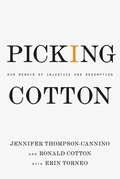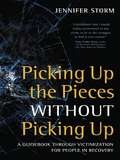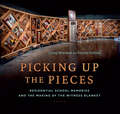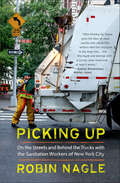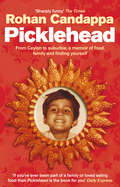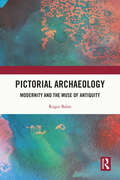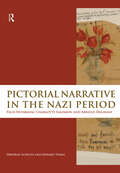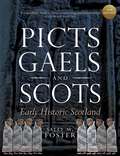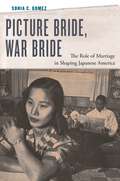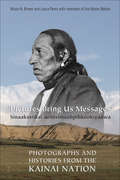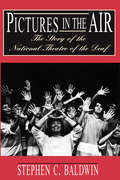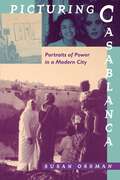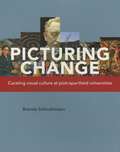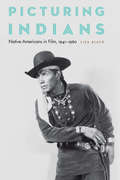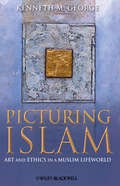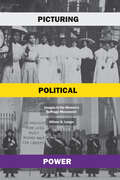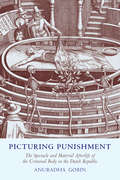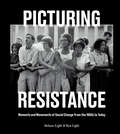- Table View
- List View
Picking Cotton: Our Memoir of Injustice and Redemption
by Erin Torneo Jennifer Thompson-Cannino Ronald CottonJennifer and Ronald unfold the harrowing details of their tragedy, and challenge our ideas of memory and judgement while demonstrating the profound nature of human grace and the healing power of forgiveness.
Picking Up the Pieces without Picking Up
by Jennifer StormAn empowering, compassionate guidebook that will assist those in recovery who have been victimized by crime or a traumatic event in healing and rebuilding their lives without returning to addictive behaviors.
Picking Up the Pieces: Residential School Memories and the Making of the Witness Blanket
by Carey Newman Kristie HudsonPicking Up the Pieces tells the story of the making of the Witness Blanket, a living work of art conceived and created by Indigenous artist Carey Newman. It includes hundreds of items collected from Residential Schools across Canada, everything from bricks, photos and letters to hockey skates, dolls and braids. Every object tells a story. <P><P> Carey takes the reader on a journey from the initial idea behind the Witness Blanket to the challenges in making it work to its completion. The story is told through the objects and the Survivors who donated them to the project. At every step in this important journey for children and adults alike, Carey is a guide, sharing his process and motivation behind the art. It's a very personal project. Carey's father is a Residential School Survivor. Like the Blanket itself, Picking Up the Pieces calls on readers of all ages to bear witness to the Residential School experience, a tragic piece of Canada’s history.
Picking Up: On the Streets and Behind the Trucks with the Sanitation Workers of New York City
by Robin NagleA “gripping” behind-the-scenes look at New York’s sanitation workers by an anthropologist who joined the force (Robert Sullivan, author of Rats).America’s largest city generates garbage in torrents—11,000 tons from households each day on average. But New Yorkers don’t give it much attention. They leave their trash on the curb or drop it in a litter basket, and promptly forget about it. And why not? On a schedule so regular you could almost set your watch by it, someone always comes to take it away.But who, exactly, is that someone? And why is he—or she—so unknown?In Picking Up, the anthropologist Robin Nagle introduces us to the men and women of New York City’s Department of Sanitation and makes clear why this small army of uniformed workers is the most important labor force on the streets. Seeking to understand every aspect of the Department’s mission, Nagle accompanied crews on their routes, questioned supervisors and commissioners, and listened to story after story about blizzards, hazardous wastes, and the insults of everyday New Yorkers. But the more time she spent with the DSNY, the more Nagle realized that observing wasn’t quite enough—so she joined the force herself. Driving the hulking trucks, she obtained an insider’s perspective on the complex kinships, arcane rules, and obscure lingo unique to the realm of sanitation workers.Nagle chronicles New York City’s four-hundred-year struggle with trash, and traces the city’s waste-management efforts from a time when filth overwhelmed the streets to the far more rigorous practices of today, when the Big Apple is as clean as it’s ever been.“An intimate look at the mostly male work force as they risk injury and endure insult while doing the city’s dirty work [and] a fascinating capsule history of the department.” —Publishers Weekly“[Nagle’s] passion for the subject really comes to life.” —The New York Times“Evokes the physical and psychological toll of this dangerous, filthy, necessary work.” —Nature“Nagle joins the likes of Jane Jacobs and Jacob Riis, writers with the chutzpah to dig deep into the Rube Goldberg machine we call the Big Apple and emerge with a lyrical, clear-eyed look at how it works.” — Mother Jones
Picklehead: From Ceylon to suburbia; a memoir of food, family and finding yourself
by Rohan CandappaRohan Candappa, author of bestselling humour books such as the Little Book of Stress and The Curious Incident of the Weapons of Mass Destruction, is the son of a Sri Lankan father and Burmese mother. He grew up small and round in South London, riding his chopper bike and supporting Leeds United. But every day his mother would conjur delicious meals out of thin air. His father cooked too, with fiery flavourings, black curries and green coriander chutneys. Their home became the focus for family gatherings and feasts of such delicacy and exoticism that you'd never have known Norwood lay outside the window.Yet somewhere in his twenties Rohan forgot his culinary heritage and it wasn't until he was bringing up his own young family that he began to think more about his identity as a second generation immigrant and the binding, identifying power of the family meal caught his imagination.And so he began this beautifully written, funny, poignant memoir of his heritage and his home. Of curry leaves and curried chips. Hot chillis and hot dogs. Pataks and Heinz. About the past and the present - and the place where time should cease to matter... the family kitchen.
Picnic Comma Lightning: The Experience Of Reality In The Twenty-first Century
by Laurence ScottIn Vladimir Nabokov’s Lolita, Humbert Humbert offers a memorably brief account of his parents’ death: “picnic, lightning.” <P><P>Picnic Comma Lightning, too, opens with death—that of Laurence Scott’s mother—because, for a philosopher, death raises a profound existential question: How do we know what is real, especially when we have come to question the reality of so many of our day-to-day experiences? <P><P>Writing from the intersection of philosophy, politics, and memoir, Scott transforms his personal meditation on loss into a beguiling exploration of what it means to exist in the world today. <P><P>It used to be that our lives were rooted in reasonably solid things: to people, places and memories. Now, in an age of online personas, alternative truths, constant surveillance and an increasingly hysterical news cycle, our realities are becoming flimsier and more vulnerable than ever before. <P><P>Scott’s far-ranging examination charts the ways our traditional mental models of the world have started to fray. He ponders how ubiquitous cameras reframe our private lives (an event only exists once someone posts the video), how mysterious algorithms undermine our attempts at self-definition through their own data-driven portraits, and what happens in those moments when our illusions about reality are ruptured by incontrovertible facts (like the death of a parent or a bolt of lightning). <P><P>“A report from the front line of the online generation” (Sunday Times), Picnic Comma Lightning is an essential account of how we’ve started to make sense of our strange new world.
Pico della Mirandola
by Massimo Riva Francesco Borghesi Michael Papio Francesco Borghesi Michael PapioThis is a new translation of and commentary on Pico della Mirandola's most famous work, the Oration on the Dignity of Man. It is the first English edition to provide readers with substantial notes on the text, essays that address the work's historical, philosophical and theological context, and a survey of its reception. Often called the 'Manifesto of the Renaissance', this brief but complex text was originally composed in 1486 as the inaugural speech for an assembly of intellectuals, which could have produced one of the most exhaustive metaphysical, theological and psychological debates in history, had Pope Innocent VIII not forbidden it. This edition of the Oration reflects the spirit of the original text in bringing together experts in different fields. Not unlike the debate Pico optimistically anticipated, the resulting work is superior to the sum of its parts.
Pictorial Archaeology: Modernity and the Muse of Antiquity
by Roger BalmThis book explores the expressly pictorial type of visual archaeology, the transcribing of three-dimensional materiality into two-dimensional depictions, and its influential history within the discipline. The picturing of ancient sites and artifacts to convey information links visual reporting with the workings of the imagination and indicates that the study of antiquity has always had a hybrid identity: part artistic and part scientific. In examining expressly pictorial forms of visual story-telling about the past, this book looks beyond certain supposed "creative turns" and focuses instead on creative continuities, answering key questions about the power of picturing and its ability to not only inform documentary practices but actively structure those practices. How are prints, drawings, paintings and photographs able to collapse the three-dimensional world of the ancient past onto a flat page but also convey a sense of material reality? In contemporary practice, how do pictorial ways of seeing enable the interpretation of material remains but also shape the recognition of digital traces on a computer screen? Published illustrations, both historical and contemporary, are primary sources of evidence for answering such questions and identifying common patterns of pictorial information. This book provides a framework for scholars researching the visual culture of archaeology as well as the history of archaeology. It is also recommended for professionals in the fields of heritage studies, conservation and community archaeology.
Pictorial Narrative in the Nazi Period: Felix Nussbaum, Charlotte Salomon and Arnold Daghani
by Edward Timms Deborah SchultzThis book investigates creative responses to the Nazi period in the work of three artists, Felix Nussbaum, Charlotte Salomon and Arnold Daghani, focusing on their use of pictorial narrative. It analyses their contrasting aesthetic strategies and their innovative forms of artistic production. In contrast with the autonomous, modernist art object, their works were explicitly linked with the historical conditions under which they were produced – the pressures of persecution and exile. Conditions in the slave labour camps and ghettos in the Ukraine, which shaped the paintings and drawings of Daghani, are contrasted with the experiences of exile in Belgium and France, which inspired Nussbaum and Salomon. In defiance of conventional artistic practice, they produced word-image combinations that can be read as narrative sequences, incorporating specific references to political events. While there has been a wealth of literary, philosophical and historical studies relating to the Holocaust, aesthetic debate has developed less extensively. This is the first comparative study of three artists who are only belatedly achieving recognition and the recent reception of their work is evaluated. By identifying the aesthetic principles and narrative strategies underlying their work, the book reassesses their achievement in creating new forms of modernism with an unmistakable political momentum.This book was published as a special issue of Word & Image.
Picts, Gaels and Scots: Early Historic Scotland (Historic Scotland Ser.)
by Sally M. FosterA look at Scotland before it was Scotland, with illustrations and photos included: &“An outstanding book.&” —Current Archaeology Early historic Scotland—from the fifth to the tenth century AD—was home to a variety of diverse peoples and cultures, all competing for land and supremacy. Yet by the eleventh century it had become a single, unified kingdom, known as Alba, under a stable and successful monarchy. How did this happen, and when? At the heart of this mystery lies the extraordinary influence of the Picts and of their neighbors, the Gaels—originally immigrants from Ireland. In this new and revised edition of her acclaimed book, Sally M. Foster establishes the nature of their contribution and, drawing on the latest archaeological evidence and research, highlights numerous themes, including the following: the origins of the Picts and Gaels; the significance of the remarkable Pictish symbols and other early historic sculpture; the art of war and the role of kingship in tribal society; settlement, agriculture, industry and trade; religious beliefs and the impact of Christianity; and how the Picts and Gaels became Scots.
Picture Bride, War Bride: The Role of Marriage in Shaping Japanese America
by Sonia C. GomezExamines the role marriage played in the lives of Japanese women during periods of racial exclusion in the United StatesIn 1908 the United States and Japan agreed to limit the migration of Japanese laborers to the US. The Gentlemen’s Agreement of 1908 ushered in an era of exclusion for the Japanese, but an exception was made for Japanese women who migrated as wives of Japanese men. In 1924 that exception would end with the passage of the National Origins Act. Immediately after World War II, Japanese women were once again permitted to enter the US as brides— this time, however, as the wives of American servicemen stationed throughout Japan. The ban on Japanese immigration would not be lifted until 1952.Picture Bride, War Bride examines how the institution of marriage created pockets of legal and social inclusion for Japanese women during the period of Japanese exclusion. Sonia C. Gomez begins with the first wave of Japanese women's migration in the early twentieth century (picture brides), and ends with the second mass migration of Japanese women after World War II (war brides), to illustrate how popular and political discourse drew on overlapping and conflicting logics to either racially exclude the Japanese or facilitate their inclusion via immigration legislation privileging wives and mothers. Picture Bride, War Bride retells the history of Japanese migration and exclusion by centering women, gender, and sexuality, and in so doing, troubles the inclusion versus exclusion binary. While the Japanese were racially excluded between 1908 and 1952, Japanese wives and mothers were permitted entry because their inclusion served American interests in the Pacific. However, the very rationale enabling their inclusion simultaneously restricted and defined the parameters of their lives within the US.Picture Bride, War Bride serves as a compelling analysis of how the intricate interplay between societal norms and political interests can both harness and contradict the interconnected frameworks of race, gender, and sexuality.
Picture Freedom
by Jasmine Nichole CobbIn the decades leading up to the end of U. S. slavery, many free Blacks sat for daguerreotypes decorated in fine garments to document their self-possession. People pictured in these early photographs used portraiture to seize control over representation of the free Black body and reimagine Black visuality divorced from the cultural logics of slavery. In Picture Freedom, Jasmine Nichole Cobb analyzes the ways in which the circulation of various images prepared free Blacks and free Whites for the emancipation of formerly unfree people of African descent. She traces the emergence of Black freedom as both an idea and as an image during the early nineteenth century. Through an analysis of popular culture of the period--including amateur portraiture, racial caricatures, joke books, antislavery newspapers, abolitionist materials, runaway advertisements, ladies' magazines, and scrapbooks, as well as scenic wallpaper--Cobb explores the earliest illustrations of free Blacks and reveals the complicated route through visual culture toward a vision of African American citizenship. Picture Freedom reveals how these depictions contributed to public understandings of nationhood, among both domestic eyes and the larger Atlantic world.
Picture Freedom: Remaking Black Visuality in the Early Nineteenth Century (America and the Long 19th Century #20)
by Jasmine Nichole CobbIn the decades leading up to the end of U.S. slavery, many free Blacks sat for daguerreotypes decorated in fine garments to document their self-possession. People pictured in these early photographs used portraiture to seize control over representation of the free Black body and reimagine Black visuality divorced from the cultural logics of slavery. In Picture Freedom, Jasmine Nichole Cobb analyzes the ways in which the circulation of various images prepared free Blacks and free Whites for the emancipation of formerly unfree people of African descent. She traces the emergence of Black freedom as both an idea and as an image during the early nineteenth century. Through an analysis of popular culture of the period—including amateur portraiture, racial caricatures, joke books, antislavery newspapers, abolitionist materials, runaway advertisements, ladies’ magazines, and scrapbooks, as well as scenic wallpaper—Cobb explores the earliest illustrations of free Blacks and reveals the complicated route through visual culture toward a vision of African American citizenship. Picture Freedom reveals how these depictions contributed to public understandings of nationhood, among both domestic eyes and the larger Atlantic world.
Pictures Bring Us Messages / Sinaakssiiksi aohtsimaahpihkookiyaawa
by Alison K. Brown Laura PeersIn 1925, Beatrice Blackwood of the University of Oxford's Pitt Rivers Museum took thirty-three photographs of Kainai people on the Blood Indian Reserve in Alberta as part of an anthropological project. In 2001, staff from the museum took copies of these photographs back to the Kainai and worked with community members to try to gain a better understanding of Kainai perspectives on the images. 'Pictures Bring Us Messages' is about that process, about why museum professionals and archivists must work with such communities, and about some of the considerations that need to be addressed when doing so.Exploring the meanings that historic photographs have for source communities, Alison K. Brown, Laura Peers, and members of the Kainai Nation develop and demonstrate culturally appropriate ways of researching, curating, archiving, accessing, and otherwise using museum and archival collections. They describe the process of relationship building that has been crucial to the research and the current and future benefits of this new relationship. While based in Canada, the dynamics of the 'Pictures Bring Us Messages' project is relevant to indigenous peoples and heritage institutions around the world.
Pictures and Tears: A History of People Who Have Cried in Front of Paintings
by James ElkinsArt Does art leave you cold? And is that what it's supposed to do? Or is a painting meant to move you to tears? Hemingway was reduced to tears in the midst of a drinking bout when a painting by James Thurber caught his eye. And what's bad about that? In Pictures and Tears, art historian James Elkins tells the story of paintings that have made people cry. Drawing upon anecdotes related to individual works of art, he provides a chronicle of how people have shown emotion before works of art in the past, and a meditation on the curious tearlessness with which most people approach art in the present. Deeply personal, Pictures and Tears is a history of emotion and vulnerability, and an inquiry into the nature of art. This book is a rare and invaluable treasure for people who love art. Also includes an 8-page color insert.
Pictures from a Drawer: Prison and the Art of Portraiture
by Bruce JacksonFor more than forty years Bruce Jackson has been documenting—in books, photographs, audio recording, and film—inmates’ lives in American prisons. In November, 1975, he acquired a collection of old ID photos while he was visiting the Cummins Unit, a state prison farm in Arkansas. They are published together for the first time in this remarkable book. The 121 images that appear here were likely taken between 1915 and 1940. As Jackson describes in an absorbing introduction, the function of these photos was not portraiture—their function was to “fold a person into the controlled space of a dossier. ” Here, freed from their prison “jackets,” and printed at sizes far larger than their originals, these one-time ID photos have now become portraits. Jackson’s restoration transforms what were small bureaucratic artifacts into moving images of real men and women. Pictures from a Drawer also contains an extraordinary description of everyday life at Cummins prison in the 1950s, written originally by hand and presented to Jackson in 1973 by its author, a long-time inmate.
Pictures in the Air: The Story of the National Theatre of the Deaf
by Stephen C. BaldwinNow available in paperback; ISBN 1-56368-140-4
Picturing Casablanca: Portraits of Power in a Modern City
by Susan OssmanIn Picturing Casablanca, Susan Ossman probes the shape and texture of mass images in Casablanca, from posters, films, and videotapes to elections, staged political spectacles, and changing rituals. In a fluid style that blends ethnographic narrative, cultural reportage, and the author's firsthand experiences, Ossman sketches a radically new vision of Casablanca as a place where social practices, traditions, and structures of power are in flux.Ossman guides the reader through the labyrinthine byways of the city, where state bureaucracy and state power, the media and its portrayal of the outside world, and people's everyday lives are all on view. She demonstrates how images not only reflect but inform and alter daily experience. In the Arab League Park, teenagers use fashion and flirting to attract potential mates, defying traditional rules of conduct. Wedding ceremonies are transformed by the ubiquitous video camera, which becomes the event's most important spectator. Political leaders are molded by the state's adept manipulation of visual media.From Madonna videos and the TV's transformation of social time, to changing gender roles and new ways of producing and disseminating information, the Morocco that Ossman reveals is a telling commentary on the consequences of colonial planning, the influence of modern media, and the rituals of power and representation enacted by the state.
Picturing Change: Curating visual culture at post-apartheid universities
by Brenda SchmahmannAn in-depth look at the evolving ethos of curating and collecting art at South African universities. In Picturing Change, Brenda Schmahmann explores the implications of deploying the visual domain in the service of transformative agendas and unpacks the complexities, contradictions and slippages involved in this process. She shows that although most new commissions have been innovative, some universities have acquired works with potentially traditionalist - even backward-looking - implications. While the motives behind removing inherited imagery may be underpinned by a desire to unsettle white privilege, in some cases such actions can also serve to maintain the status quo. This book is unique in exploring the transformative ethos evident in the curation of visual culture at South African universities. It will be invaluable to readers interested in public art, the politics of curating and collecting, as well as to those involved in transforming tertiary and other public institutions into spaces that welcome diversity. Since South Africa's transition to democracy, many universities have acquired new works of art that convey messages about the advantages of cultural diversity, and engage critically with histories of racial intolerance and conflict. Given concerns about the influence of British imperialism or Afrikaner nationalism on aspects of their inherited visual culture, most tertiary institutions are also seeking new ways to manage their existing art collections, and to introduce memorials, insignia or regalia, which reflect the universities' newfound values and aspirations.
Picturing Dogs, Seeing Ourselves: Vintage American Photographs (Animalibus: Of Animals and Cultures #4)
by Ann-Janine MoreyDogs are as ubiquitous in American culture as white picket fences and apple pie, embracing all the meanings of wholesome domestic life—family, fidelity, comfort, protection, nurturance, and love—as well as symbolizing some of the less palatable connotations of home and family, including domination, subservience, and violence. In Picturing Dogs, Seeing Ourselves, Ann-Janine Morey presents a collection of antique photographs of dogs and their owners in order to investigate the meanings associated with the canine body. Included are reproductions of 115 postcards, cabinet cards, and cartes de visite that feature dogs in family and childhood snapshots, images of hunting, posed studio portraits, and many other settings between 1860 and 1950. These photographs offer poignant testimony to the American romance with dogs and show how the dog has become part of cultural expressions of race, class, and gender.Animal studies scholars have long argued that our representation of animals in print and in the visual arts has a profound connection to our lived cultural identity. Other books have documented the depiction of dogs in art and photography, but few have reached beyond the subject’s obvious appeal. Picturing Dogs, Seeing Ourselves draws on animal, visual, and literary studies to present an original and richly contextualized visual history of the relationship between Americans and their dogs. Though the personal stories behind these everyday photographs may be lost to us, their cultural significance is not.
Picturing Indians: Native Americans in Film, 1941-1960
by Liza BlackStanding at the intersection of Native history, labor, and representation, Picturing Indians presents a vivid portrait of the complicated experiences of Native actors on the sets of midcentury Hollywood Westerns. This behind-the-scenes look at costuming, makeup, contract negotiations, and union disparities uncovers an all-too-familiar narrative of racism and further complicates filmmakers&’ choices to follow mainstream representations of &“Indianness.&” Liza Black offers a rare and overlooked perspective on American cinema history by giving voice to creators of movie Indians—the stylists, public relations workers, and the actors themselves. In exploring the inherent racism in sensationalizing Native culture for profit, Black also chronicles the little-known attempts of studios to generate cultural authenticity and historical accuracy in their films. She discusses the studios&’ need for actual Indians to participate in, legitimate, and populate such filmic narratives. But studios also told stories that made Indians sound less than Indian because of their skin color, clothing, and inability to do functions and tasks considered authentically Indian by non-Indians. In the ongoing territorial dispossession of Native America, Native people worked in film as an economic strategy toward survival. Consulting new primary sources, Black has crafted an interdisciplinary experience showcasing what it meant to &“play Indian&” in post–World War II Hollywood.
Picturing Islam: Art and Ethics in a Muslim Lifeworld
by Kenneth M. GeorgePicturing Islam: Art and Ethics in a Muslim Lifeworld explores issues of religion, nationalism, ethnicity, and globalization through the life and work of the prominent contemporary Indonesian artist Abdul Djalil Pirous. Presents a unique addition to the anthropology of art and religion Demonstrates the impact of Islam, ethnicity, nationalism, and globalization on the work and life of an internationally recognized postcolonial artist Weaves together visual and narrative materials to tell an engrossing story of a cosmopolitan Muslim artist Looks at contemporary Islamic art and the way it has been produced in the world's largest Muslim nation, Indonesia
Picturing Political Power: Images in the Women’s Suffrage Movement
by Allison K. LangeFor as long as women have battled for equitable political representation in America, those battles have been defined by images—whether illustrations, engravings, photographs, or colorful chromolithograph posters. Some of these pictures have been flattering, many have been condescending, and others downright incendiary. They have drawn upon prevailing cultural ideas of women’s perceived roles and abilities and often have been circulated with pointedly political objectives. Picturing Political Power offers perhaps the most comprehensive analysis yet of the connection between images, gender, and power. In this examination of the fights that led to the ratification of the Nineteenth Amendment in 1920, Allison K. Lange explores how suffragists pioneered one of the first extensive visual campaigns in modern American history. She shows how pictures, from early engravings and photographs to colorful posters, proved central to suffragists’ efforts to change expectations for women, fighting back against the accepted norms of their times. In seeking to transform notions of womanhood and win the right to vote, white suffragists emphasized the compatibility of voting and motherhood, while Sojourner Truth and other leading suffragists of color employed pictures to secure respect and authority. Picturing Political Power demonstrates the centrality of visual politics to American women’s campaigns throughout the nineteenth and early twentieth centuries, revealing the power of images to change history.
Picturing Punishment: The Spectacle and Material Afterlife of the Criminal Body in the Dutch Republic
by Anuradha GobinPicturing Punishment examines representations of criminal bodies as they moved in, through, and out of publicly accessible spaces in the city during punishment rituals in the seventeenth-century Dutch Republic. Once put to death, the criminal cadaver did not come to rest. Its movement through public spaces indicated the potent afterlife of the deviant body, especially its ability to transform civic life. Focusing on material culture associated with key sites of punishment, Anuradha Gobin argues that the circulation of visual media related to criminal punishments was a particularly effective means of generating discourse and formulating public opinion, especially regarding the efficacy of civic authority. Certain types of objects related to criminal punishments served a key role in asserting republican ideals and demonstrating the ability of officials to maintain order and control. Conversely, the circulation of other types of images, such as inexpensive paintings and prints, had the potential to subvert official messages. As Gobin shows, visual culture thus facilitated a space in which potentially dissenting positions could be formulated while also bringing together seemingly disparate groups of people in a quest for new knowledge. Combining a diverse array of sources including architecture, paintings, prints, anatomical illustrations, and preserved body parts, Picturing Punishment demonstrates how the criminal corpse was reactivated, reanimated, and in many ways reintegrated into society.
Picturing Resistance: Moments and Movements of Social Change from the 1950s to Today
by Ken Light Melanie LightA compelling photographic history of the important moments of progressive resistance--from the civil rights movement to the present--to inspire the change-makers and activists of today.A powerful commemoration of notable moments of protest, Picturing Resistance highlights the important American social justice movements of the last seven decades. Including both black-and-white and color photographs, this important record pairs iconic and unexpected images with insightful narrative captions that contextualize the meanings behind the moments. UC Berkeley Graduate School of Journalism professor Ken Light and author Melanie Light have carefully curated unconventional photographs of the most memorable moments in twentieth- and twenty-first-century protest history, offering a fresh perspective on these important occasions. In place of the iconic image of Martin Luther King, Jr. speaking at the March on Washington, Picturing Resistance conveys the feeling of pain and frustration of the time period by instead showing him moments after being arrested, restrained against a police station table. The moments captured in Picturing Resistance take the reader on a journey through decades of people-powered protest, featuring images from the front lines of the civil rights, women's, environmental, and disability rights movements, as well as contemporary movements like Black Lives Matter and March for Our Lives. Picturing Resistance will inspire revolutionary thinkers, activists, and dreamers of all stripes to celebrate the milestones of the past as we build a progressive future.
